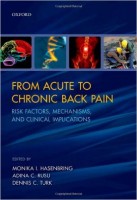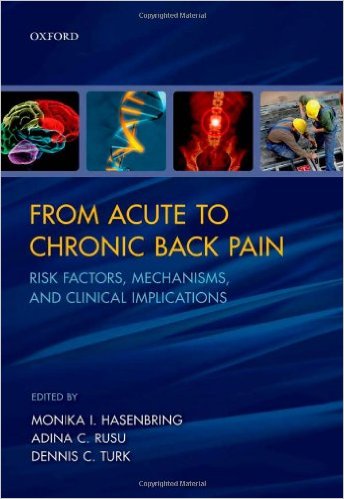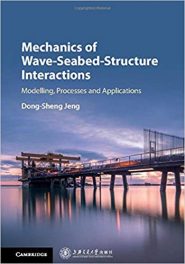 Editors: Monika I. Hasenbring, Adina C. Rusu, and Dennic C. Turk
Editors: Monika I. Hasenbring, Adina C. Rusu, and Dennic C. Turk
Publisher: Oxford University Press – 590 pages
Book Review by: Nano Khilnani
The word acute means sharp, or having severe characteristics or symptoms, often requiring immediate care and sometimes emergency treatment, such as for conditions like acute coronary syndrome or acute respiratory distress syndrome (ARDS).
For the word chronic one can think of several synonyms, including: persistent, recurring, and unchanging. We can also think of several phrases and clauses to describe chronic, such as slow progression, hardly showing a difference over time, and stubbornly static.
Acute pain is a condition that increasingly larger numbers of people in the United States are developing. Sometimes acute pain turns into chronic pain. One major cause of distress, disability and work loss here in this country is chronic back pain.
The editors point out that with an aging population, larger numbers of people are developing chronic back pain, and this problem, with more and more people unable to go to work for long and longer periods of time, has become a huge cost to society. Rising health care premiums are a means employed by the health insurance companies to recoup – the expenses paid out for a few customers – from other customers.
This book was written to share – with those professionals who treat patients with acute and chronic back pain – an understanding of the variables that contribute to the development of chronic back pain. Important psychological and psychobiological mechanisms have been identified, over the course of the last 15 years, as important risk factors in back pain.
The discovery of these risk factors has led researchers and clinicians to develop early screening methods and new psychosocial interventions. These monitoring and treatment methods work when closely tailoring them to patients’ needs. But a dark area still exists and that is the lack of answers to the question of why and how acute pain turns into chronic pain.
So this book discusses the risk factors: biomechanical, genetic, neurobiological, psycho-physiological, psychosocial, and socioeconomic risk factors. And in turn, it takes a look at advances in treatment methods based on research and evidence in published studies. These solutions to problems range from the prevention of disability caused by chronic back pain, to pharmacological, psychological, and rehabilitative methods.
Sixty-two contributors from eight countries – Australia, Canada, Germany, the Netherlands, Sweden, Switzerland, the United Kingdom, and the United States – wrote the 30 chapters of this book, the contents of which are allocated to these nine Parts:
- Current Developments in Epidemiology
- Risk Factors of Chronic Back Pain and Disability: Biological Mechanisms
- Risk Factors of Chronic Back Pain and Disability: Biomechanical Mechanisms
- Risk Factors of Chronic Back Pain and Disability: Socio-demographic and Psychosocial Mechanisms
- Practitioner’s Role in the Process of Care
- Clinical Implications; New Approaches to Diagnostics and Treatment
- Clinical Approaches for Patients with Acute and Sub-acute Low Back Pain
- Subgroup-Specific Approaches for Patients at Risk for, or With Acute Pain
- Clinical Approaches for Patients With Established Pain and Disability
This book is a valuable guide to those working in the fields of clinical and health psychology, and in physiology, epidemiology, and pain management. You will find almost 600 pages of useful knowledge, with discussions and graphics presented visually in charts, diagrams, sketches, and tables.
Editors:
Monika I. Hasenbring, PhD is Chair of the Department of Medical Psychology and Medical Sociology in the Faculty of Medicine at Ruhr-University in Bochem, Germany.
Adina C. Rusu, PhD works in the Department of Medical Psychology and Medical Sociology in the Faculty of Medicine at Ruhr-University in Bochem, Germany. She is also affiliated with the Department of Psychology, Royal Holloway, at University of London in London, United Kingdom.
Dennis C. Turk, PhD works in the School of Medicine at University of Washington in Seattle, Washington.







